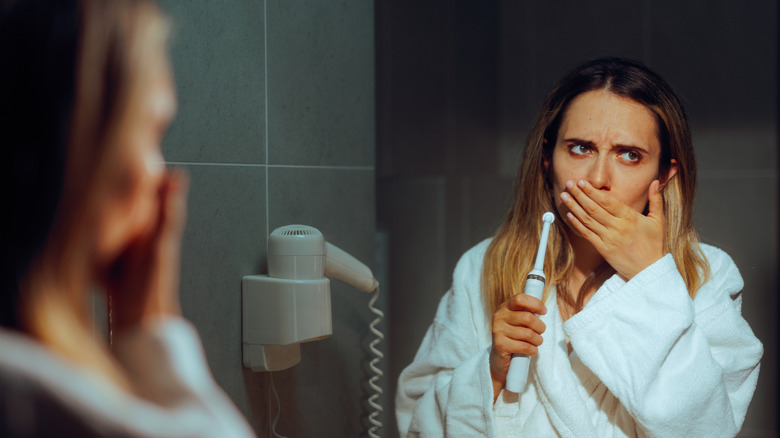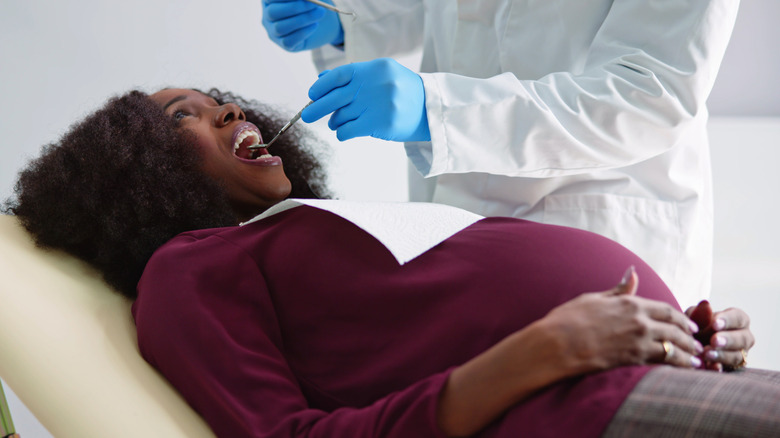
Nicoleta Ionescu/Shutterstock
Pregnancy does a number on the body — and in ways you may not have fathomed. From morning sickness to drastic emotional changes to physical aches and pains, carrying a baby to term is no walk in the park. If that weren’t enough, to add to the onslaught of changes that the body endures during pregnancy, you can also experience shifting in your teeth. Yes, your teeth might actually move.
“During pregnancy, women go through a lot of hormonal changes, especially with higher levels of estrogen and progesterone,” Ashley Boling, DDS, practice owner at Aspen Dental, told Health Digest, adding that the hormonal effect can loosen the ligaments and bones that are meant to keep teeth in place. “Because of these changes, the body can react more strongly to bacteria, making gums more likely to get inflamed and teeth more prone to shifting,” she said.
Although not every person will experience tooth shifting while pregnant, it is a potential side effect of fluctuating hormones, so it’s definitely something to be aware of. There’s absolutely no sense in having any additional surprise moments throughout your pregnancy.
How to prevent teeth from moving during pregnancy

Rido/Shutterstock
While preventing all movement of teeth isn’t possible, you can still take steps to limit how much they do move. For starters, you absolutely want to avoid some of the common mistakes you could be making with your oral care. “Try to brush your teeth twice a day with fluoride toothpaste for at least two minutes each time, and don’t forget to floss once a day to get rid of any food particles stuck between your teeth,” said Boling, adding that drinking water throughout the day also helps in keeping the mouth clean and healthy.
But because pregnancy can be a turbulent time in some people’s lives, sticking to a routine can be tricky. For others, there may also be an issue with a sensitive gag reflex or tender gums, according to Boling. If that’s the case, don’t just stop brushing, because you do have options. “If brushing feels uncomfortable, try using a toothbrush with a smaller head or switching to a toothpaste that doesn’t foam as much,” said Boling. “If flossing is tricky, a water flosser can be a gentler option.” What’s most important is that you keep your mouth as clean as possible to not only minimize teeth shifting about, but also because good oral hygiene may be essential to the health of your baby.
What to do if your teeth move during your pregnancy

Andrey_Popov/Shutterstock
If you’re one of the many people who experience teeth shifting during your pregnancy, then your first point of contact should be your dentist or orthodontist. Depending on how much your teeth have shifted, you may be able to get away with aligners or, if the shift was fairly big, you might find yourself in braces again. You won’t really know until you speak to a professional. “If gum issues are involved, your dentist might suggest deep cleanings or other treatments to keep your gums healthy,” said Boling. “Regular checkups and good oral care are important to maintain your smile after pregnancy.”
As much as teeth moving during pregnancy is common, it doesn’t necessarily mean it will happen to you. With that in mind, the best thing you can do for yourself and your baby is to stay on top of oral hygiene. If you end up needing some sort of orthodontic care, then you can worry about that when it happens. In the meantime, just focus on brushing at least twice a day and keeping your body and mouth hydrated with plenty of water (how to determine the right amount of water for you).
Credit: healthdigest.com










